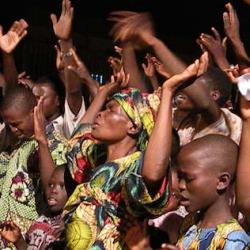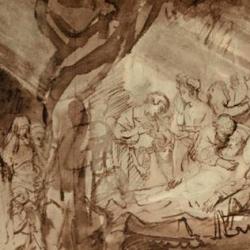Again, much of this is from Jim Jordan ‘s From Bread to Wine .
Kingly Rule, 1 Kings 3:1-28
INTRODUCTION
Israel moved from its priestly to its kingly phase through a process of destruction and renewal. The Mosaic order broke down after the battle of Aphek (1 Samuel 4-6), and the Mosaic tabernacle was never restored. Decades later, Yahweh set David on the throne and established the dynasty that ruled Israel until the exile. So also in our lives, the transition from priestly to kingly rule, like the transition from childhood to priesthood, involves death and resurrection.
THE TEXT
?Now Solomon made a treaty with Pharaoh king of Egypt, and married Pharaoh?s daughter; then he brought her to the City of David until he had finished building his own house, and the house of the Lord, and the wall around Jerusalem . . . .?E(1 Kings 3:1-28).
KINGS IN THE BIBLE
What does it mean to be a king? What do kings do in Scripture? First, obviously, kings rule. While priests are servants in a royal house and work under the authority of others, kings rule over those who are under their authority. One aspect of rule in Scripture has to do with passing judgment. This privilege is sometimes described in Scripture with the phrase ?knowing good and evil?E(2 Samuel 14:17; 1 Kings 3:1-9). This is the privilege that Adam seized when he ate the tree in the garden. Through the Spirit, kings are enabled to pass judgment.
Second, again obviously, kings are responsible for the well-being and health of their people. This was worked out in a unique way in the Davidic covenant, in which the Davidic king was set up as the representative of the whole nations (2 Samuel 7). The king was Yahweh?s ?son?E(2 Samuel 7:14), as Israel was (Exodus 4:22-23), and the corporate son?s fate turned on the faithfulness of the individual royal son. The broader point is that kings, even those who are not under the specific terms of the Davidic covenant, are responsible for the good of their people. They rule, but they are to rule as God rules, in self-giving service.
Third, kings are conquerors. In the OT, this is especially true of David, who finished off the conquest of the land, and extended Israel?s dominions to surrounding lands (2 Samuel 5). By the time Solomon took the throne, his lands extended from the Euphrates to the Mediterranean, and down to the borders of Egypt (1 Kings 4:21).
Fourth, kingship is associated with glory. Aaronic priests wore garments of glory and beauty (Exodus 28:2), and the tabernacle was also a glorious house. Though the priestly covenant was with glory, the Davidic covenant was greater in glory. The Queen of Sheba, who was no stranger to royal abundance and beauty, was breathless when she saw the richness and order of Solomon?s table (1 Kings 10:1-10). Yahweh has a glorious throne in the Most Holy Place, but Solomon?s throne was equally wonderful, and could be seen by Israel (10:18-20). Solomon?s temple was larger and more awesome than the tabernacle.
Finally, kingship is associated with wisdom. Priests follow detailed regulations, ordinances, and statutes. Kings have to exercise wisdom. Wisdom literature first appears during Israel?s monarchy, taking the form of Psalms of wisdom (from David) and Proverbs and songs (from Solomon). Kings are required to know the Torah (Deuteronomy 17:18-20), but they also had to exercise wisdom in applying the Torah to situations that were not directly spelled out (cf. 1 Kings 3:16-28).
THE ROYAL STAGE OF LIFE
These various aspects of kingly life in the Bible apply to the royal stage of life. After a period of priestly apprenticeship, we begin to have wider areas of authority and rule. Fathers and mothers rule as kings and queens over the children of the family. Mothers rule over the house, and fathers seek to rule and conquer in their vocations.
At this stage of life, enhancing and glorifying life becomes possible and important. During the priestly stage, you can be satisfied with living in a tent, as Yahweh was in the wilderness. When you enter the kingly stage, you should look for ways to enhance and beautify the world that is under your control. Of course, even here there are priorities.
TEMPTATIONS OF KINGS
There are a number of temptations that are especially strong during the royal stage of life. First, as you begin to exercise authority, you are tempted to flaunt it. After diligently slaving away in a company for a time, you rise in the corporate ladder and begin to push around the employees who are in the position you used to be in. Or, you become a dictator in your home, ruling your children harshly and causing frustration and resentment (Ephesians 6:4). Many people, especially men, act this way because they begin to rule without ever learning to serve, and they rule without recognizing that godly rule is always a form of service.
Second, there is a temptation to seize more than the Lord has given. Joseph was set up over all Potipher?s house, and was tempted to seize his wife. Joseph refused, and passed the test; though he was thrown into prison for a time, he eventually rose to even greater heights of power. David became comfortable in his kingship, and seized the wife of one of his leading fighting men (2 Samuel 11-12). A king, like a priest, is called to wait on the Lord.
Third, kings and queens are tempted to irresponsibility. Men who have responsibility to rule a family or to exercise dominion in a calling avoid responsibility and want to spend time playing. Especially in early middle age, men are tempted to abandon responsibility, and act like teenagers.
Finally, the Bible frequently shows that kings go through a crisis of loss and decline before entering the final stage of maturity. Abraham was called to sacrifice the son he had awaited for years. Jacob was in danger of facing a hostile reception from Esau when he finally returned home from serving Laban, and he had to wrestle with God before crossing back into the land. David?s sin with Bathsheba led to Absalom?s revolt, during which David lost the kingdom for a time.
So also, it is commonly the case that we face a crisis in the midst of the royal phase of life. It might be caused by our own sin, or it might be brought on by providential circumstances. It might involve losing a child, or losing a career, or losing a wife. God often brings us to deep maturity through this kind of major crisis and loss.
THERE IS A TIME
In our OT reading this morning, Solomon emphasizes that human life is constantly shifting, and that each experience has its proper time. Wisdom has much to do with timing; it is all about learning whether the circumstances demand a dirge or a dance, a funeral march or a festive parade. We face a constant temptation to do the right thing at the wrong time.
Catechism for Little Saints
What do kings do?
Kings rule, judge, conquer, glorify, all for the good of their people.
How can a normal Christian be a king?
By ruling his family, conquering new territory in his labor, and glorifying his home and property.















